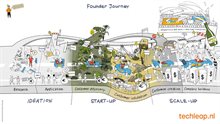Read the study
In ‘Europe's Path to Enable Tech-Driven Startups: on its Path to a New, Cleaner, and Fairer Economy’, Sabine Kerssens compares the support at different start-up growth stages. You can find her research on pages 72 to 81 of the report.
Deep-tech innovations crucial for societal challenges
“By ‘deep tech’ we mean young companies that want to bring complex technological innovations that can make a huge difference for social issues to the market,” Kerssens explains. “I like to call it ‘disruptive technology’, which is important for the climate, food, safety, or health, for example. Examples include technologies to tackle plastic in the oceans, 3D printing of concrete, or photosynthesis for converting CO2 into useful substances. Without this kind of technology, we won’t achieve our development goals. But because it is so complicated, entrepreneurs often spend more than seven years trying to scale an idea so that it’s market-ready.”
Three phases of deep tech
There are a lot of hurdles that a young company has to overcome on the long road ahead of them. As a systems engineer and orchestrator at TNO Vector, Kerssens is well versed in building ecosystems around technology.
For this research, commissioned by Germany’s prestigious Charlemagne Prize Academy, she unravels the journey of deep tech in three phases: ideation, start-up growth, and scale-up.
For each phase, different skills are always needed to guide a young company through that phase to market. Skills like finding customers for your product, building your business, and finding financiers for your capital needs, which can add up considerably at each stage.

Deep tech in three phases: ideation, start-up growth, and scale-up.
Poorer opportunities for deep-tech companies in Europe
The research builds on insights and data from parties that track this kind of market intelligence, including dozens of interviews with international experts. “What I am seeing is that Europe has an excellent breeding ground of good ideas, talent, capital, and research. But supporting an entrepreneur in the early phase requires different skills from those needed later to grow the business.
For a company to make an impact in the EU economy, that growth has to be well supported from start to finish. Europe does not offer a company the same opportunities as, say, the US and Israel. This means deep-tech companies are growing more slowly than elsewhere, which also ultimately risks not reaching development goals.”
Valuing entrepreneurship differently
In previous research that Kerssens conducted with Utrecht University, cultural differences were found to hold businesses back. “Successful entrepreneurship is valued significantly lower in the EU and therefore in the Netherlands than in the US for example. Passing on entrepreneurial successes to future generations - to young employees - also happens much less. The number of new companies that may be considered spin-offs from previous start-ups is considerably lower here. To give you an idea, roughly 330 companies emerged from Uber and 12 from Dutch company Adyen.”
Lack of support for deep-tech start-ups
The survey also highlights the lack of support for start-ups. “By this I mean limited access to capital, for example. There are quite a lot of financial means out there, at both a country and EU level, but if you compare that with Israel, for example, it’s all very fragmented. Entrepreneurs don’t know where to turn and are afraid they’ll be hampered with more overheads and bureaucracy.”
But it is not just about the funding, of course. Kerssens: “There is arguably less appreciation for the unicorns. I think studio collaborations in Singapore are a good example of this, where academics come together in person with the government and the private sector to create early-stage companies.
It’s also about access to talent, to the market, and to a network that you can use to market that new technology. With public initiatives that actively support emerging deep-tech technology, help often stops at the border. All too often you come up against legislation or costs that differ from one EU country to another. The EU is by no means a single market in that respect.”
The need to join forces across the EU
Kerssens concludes her paper with a call for action. “This is a message for EU policymakers inside and outside this project. If we want to achieve our Sustainable Development Goals and other goals, we have to join forces at European level to help support young deep-tech entrepreneurs. Venture capitalists, business angels, limited partners, and other financiers see deep tech as an attractive growth market and want a slice of the action.
There have also been attempts to pool support in the past, especially from bottom up, but these have not delivered the results we want. The European Commission needs to step in. Learn from the economies around us and help get these great ideas off the ground!”
Kerssens would like to see what she does as an orchestrator at TNO Vector replicated on a European scale: building ecosystems around research that create value and form solid companies. “This research methodology can hopefully contribute to that. The EU has tremendous innovation power, but we need to be able to harness it better for our economy’s advantage. The good news is that building ecosystems around deep tech is a concept that is rapidly evolving. It also takes time, but Silicon Valley wasn’t built in a day either.”



